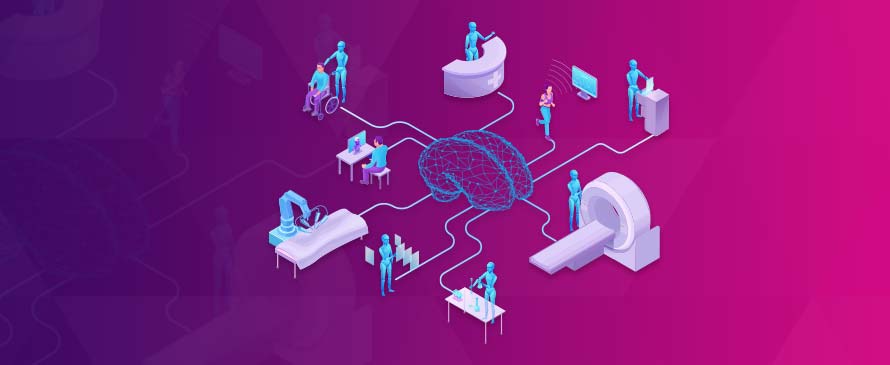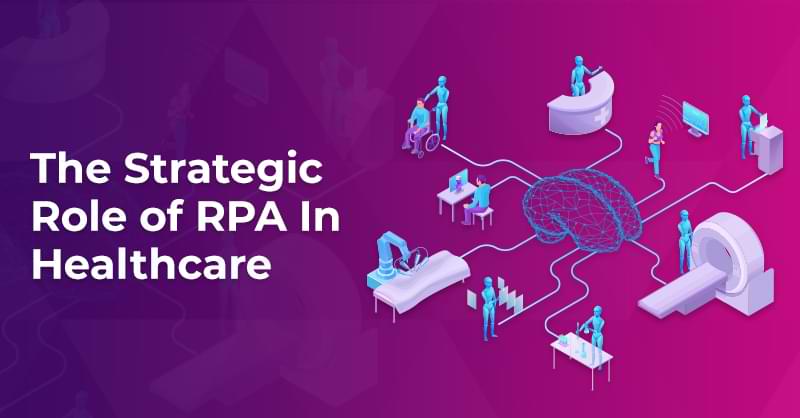The Strategic Role of RPA In Healthcare

Written by Afsa Ashraf
Content Writer
September 24, 2022
Automation is a highly discussed and embraced technology in today’s period. The benefits are immense. Considering the kind of services the healthcare industry provides, it was previously thought that automation’s scope is very low. The reason is the high skill sets required for the job, shortage of resources, and exponentially growing demand for health workers. The effort to reduce costs is countered by the need to constantly improve the patient experience and meet regulations that often require difficult reporting and paperwork.
In healthcare corporations, many repetitive processes and decisions depend on the availability of accurate data analytics. For instance, patient onboarding and follow-ups, medical billing and claims processing, generating reports for doctors, and prescription management are a few common recurring tasks in healthcare organizations. These are the factors that create the perfect environment for robotic process automation (RPA) to increase efficiency, reduce costs and enhance the patient experience in healthcare automation.
What is Robotic Process Automation (RPA)?
Robotic process automation (RPA) is an automation technology that uses software to mimic the back-office tasks of human workers, such as extracting data, filling in forms, and moving files. It combines APIs and user interface (UI) interactions to integrate and perform repetitive tasks between enterprise and productivity applications. By deploying Bots that emulate human processes, RPA tools complete the autonomous execution of various tasks, activities, and transactions across unrelated software systems. RPA, together with machine learning and artificial intelligence, can manage several complex business tasks that are time-consuming and require a fair amount of human effort. RPA will help to optimize the cost and output, enabling resources to focus on complex and high-value tasks.
Scope of RPA in Healthcare
Studies estimate that the healthcare industry collectively spends $2.1 billion yearly on poorly performed and error-prone manual tasks around provider data management alone! Likewise, insurance companies spend between $6 million to $24 million annually to mend poor provider data quality. The digital systems in the healthcare field that can gain from RPA are highly inefficient, so much so that it has started affecting every aspect of the industry. From claims operations to customer support and billing. Each and every single manual process has inefficient operational errors and incorrect data transfer.
Even though we can foresee the financial losses occurring due to operational inefficiencies, it is hard to determine the exact costs when considering the inefficiency caused when these systems are not automated. This means that the actual value can be much more than our expectations. Many research reports have revealed that in the following decade, more than 50% of the interactions will be automated through RPA. This also means that healthcare providers and others that don’t keep up with the industry trends will face financial downfall eventually. Their customer loyalty will reduce, customer experience will decline, and competitive advantage will suffer.
Ineffective healthcare systems still depend on manual tasks and processes, which are unsustainable and weak. RPA or robotic process automation can reduce inefficient processes and tasks by automating judgment-based complex actions. RPA can offer a seamless execution of front office tasks such as:
Patient Record Transfers
Synching Patient Data
Diet Plan Management
Appointment Scheduling
Discharge Instructions
Billing
Claims Processing
It is fair to expect that RPA will transform the healthcare industry because of its proven effect on saving time and effort and reducing costs. In addition, implementing RPA will enable healthcare professionals to concentrate on improving patient outcomes.
Conclusion
At Royal Cyber, our advanced RPA healthcare solutions have the flexibility to be implemented in challenging environments, like the hospital industry, and allow clients to benefit from Bot optimization capabilities. Post implementation, our clients could cover 30% more workflows and cut testing cycles by 25%, leading to faster deployment times.
As technology advances, adopting Robotic Process Automation is critical for healthcare companies looking to serve a higher volume of patients while simultaneously improving patient outcomes without extensive expenditures or straining healthcare personnel. To find out more, visit us at www.royalcyber.com and contact us at [email protected].
Recent Blogs
- Middleware is often considered the glue that binds different systems and connecting platforms, and it …Read More »
- Learn to write effective test cases. Master best practices, templates, and tips to enhance software …Read More »
- In today’s fast-paced digital landscape, seamless data integration is crucial for businessRead More »











